How Do I Decide if I Need A lawyer for My Divorce? A Step-by-Step Guide to Making the Right Decision

Many people ask me, “Do I really need to hire a lawyer for my divorce?” As you might suspect, the answer isn’t always straightforward, so I’ve put together the following list of considerations to help you decide what’s best in your situation.
As a general rule, I believe almost every divorce case warrants at least a consultation with a lawyer. Why? Because information is power, and gathering as much as possible, as early in the process as you can, is to your benefit.
Here are some specific things to consider:
1. The Complexity of Your Case
Divorces range in complexity, from amicable separations where both parties agree on everything to highly contested cases involving child custody, property division, or allegations of misconduct. The complexity of your case is one of the most important factors when deciding whether to hire a lawyer.
- Simple, uncontested divorce: If you and your spouse have agreed on all key issues—such as division of property, child custody, and support payments—you may not need a lawyer during the process, but I still recommend a consultation so you can make sure you’ve covered everything necessary. Many attorneys will review your information without a retainer. These are called unbundled services and can be invaluable, especially if you have done most of the work yourself.
- Complicated or contested divorce: If your divorce involves significant assets, debt, business ownership, children, or disagreement on terms, it’s advisable to have a lawyer. A lawyer can help navigate complex legal issues and ensure that you’re not taken advantage of during the process. For instance, in situations where one party hides assets or there’s disagreement over custody arrangements, a lawyer’s expertise is critically important.
2. The Emotional Toll and Legal Knowledge
Having a lawyer ensures that a professional is looking out for your interests while you focus on your emotional well-being. I often say that it’s a brutal irony that we need to be at our decision-making best despite feeling our emotional worst.
- Legal expertise: Divorce laws vary from state to state, and the legal process can be complicated. If you’re unfamiliar with local laws or legal jargon, hiring a lawyer helps you avoid making costly mistakes. Whether it’s understanding how assets are divided or calculating child support payments, a lawyer will ensure that all legal aspects are handled properly.
- The decisions you’ll make during this time will impact your life for years! Don’t underestimate the toll the emotional strain takes on your ability to make the best decisions possible. Getting the emotional support you need during this time, from a therapist or divorce coach, can help you recognize when you’re making emotional, vs. rational decisions, and move toward compromise.
3. Financial Considerations: The Cost of Hiring a Lawyer
One of the primary concerns when hiring a lawyer is the cost. Divorce lawyers typically charge by the hour, and fees can quickly add up, especially in contested cases. However, not hiring a lawyer in complex cases could lead to costly mistakes, such as an unfair division of assets or losing out on important legal rights.
- Upfront costs: Fees vary based on your location, the lawyer’s experience, and the complexity of your case. However, many people find that the cost is worth it, as it helps ensure a fair settlement.
- Long-term savings: In many cases, hiring a lawyer saves you money in the long run. If you make mistakes while handling the divorce yourself, you may end up in costly post-divorce litigation to fix these issues. Additionally, a lawyer can ensure that you’re not agreeing to unfavorable terms out of confusion or emotional stress, which could have long-term financial consequences.
4. Child Custody and Support: A Critical Decision Area
If you have children, determining child custody and support arrangements can be one of the most important and challenging aspects of a divorce. A lawyer can help you understand your rights, craft your case for custody, and ensure that child support arrangements are fair and enforceable.
- Child custody disputes: If you and your spouse disagree on custody arrangements, a lawyer can help present evidence to support your desired custody outcome, whether you are seeking sole or joint custody. They will also help ensure your parenting agreement is in the best interests of the child(ren), which courts prioritize.
- Child support: Calculating child support can be complicated, especially if one spouse is self-employed or has a fluctuating income. A lawyer can make sure that child support is calculated correctly and that the payments are in line with state guidelines. They will also ensure that the support agreement is enforceable in court.
5. Mediation and Collaborative Divorce as Alternatives
If you and your spouse are looking for a different approach, consider mediation or collaborative divorce. Both options allow for creative settlements that meet your family’s unique needs and you still receive professional guidance.
- Mediation: In mediation, a neutral third party (often a lawyer or a trained mediator) helps both spouses negotiate the terms of the divorce. While mediators cannot provide legal advice, they can help facilitate discussions and guide you through important decisions. Mediation is generally less expensive and time-consuming than hiring a lawyer for each party.
- Collaborative divorce: In a collaborative divorce, each spouse hires their own lawyer, but instead of going to court, both parties agree to resolve the divorce through negotiation. The lawyers help guide the process and ensure that both parties understand their legal rights without escalating the conflict.
6. When Don’t I Need A Lawyer?
In some cases, it may make sense to handle the divorce on your own. These situations are usually limited to cases where there is little or no conflict, few assets, and no children involved. Online divorce services or court-provided forms can help guide you through the process.
- Uncontested divorce: If you and your spouse agree on all aspects of the divorce, doing it yourself can save time and money. Many states offer streamlined processes for uncontested divorces, where you can simply fill out the necessary paperwork and submit it to the court without ever hiring an attorney.
- DIY divorce kits and online platforms: If you opt to handle the divorce without a lawyer, online services offer step-by-step guides and document preparation. These platforms can provide legal forms and instructions at a fraction of the cost of hiring a lawyer.
However you choose to move forward, remember that even a low conflict divorce can be stressful and emotionally taxing. Download my list of 10 First Steps and remember to be kind to yourself as you navigate this journey! Ultimately, the right decision for you may be different than how others you know approached divorce. It’s correct for you if it aligns with the complexity of your situation, your budget, and your long-term goals.
